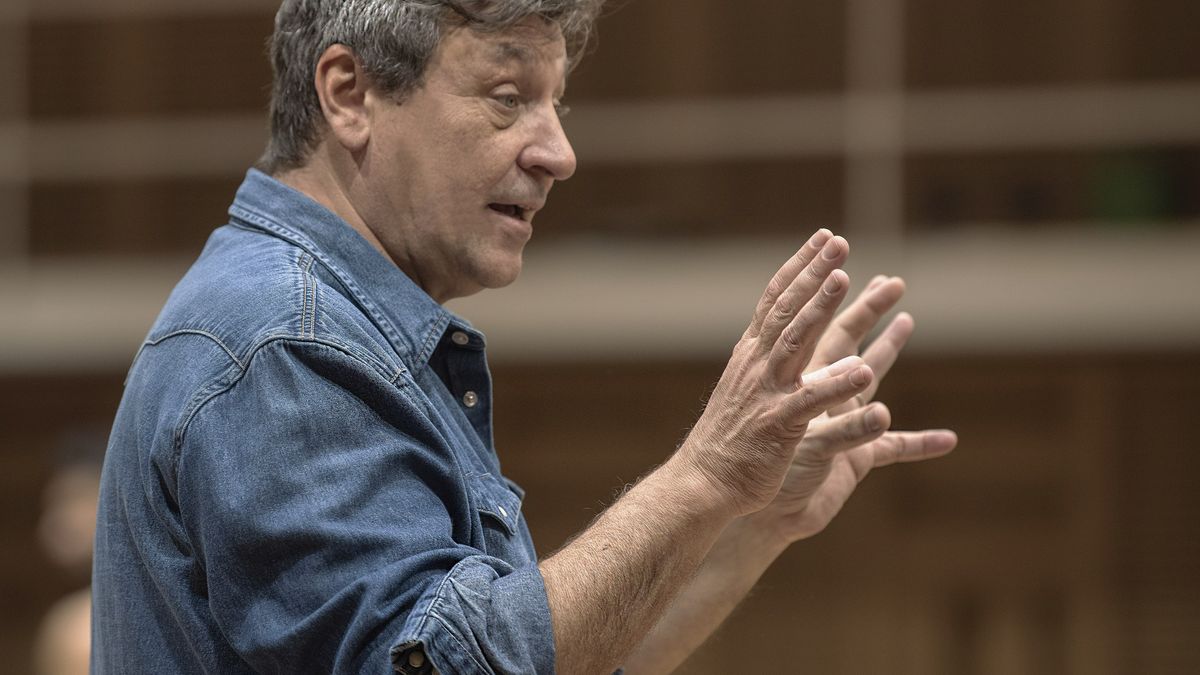“Ariadne in Naxos”the opera of Richard Strauss, The lyrical season of the Teatro Colón will open tonight at 8 p.m.. This is the version of Marcelo Lombardero (who returns with her to Colón) known in 2019, and which will be represented with two different casts. In addition to tonight’s performance, it will also be seen on Sunday at 5 p.m., and from Tuesday the 16th to Friday the 19th at 8 p.m. The Stable Orchestra will be conducted by the Austrian Günter Neuhold.
The work, with a libretto by the regular collaborator of Strauss, Hugo von Hofmannsthal, was premiered in 1912. It is a story of theater within the theater (or opera within the opera), in which a great party is prepared in a palace of the Viennese bourgeoisie that will culminate with a fireworks show. Inside there will be the representation of a drama and a comedy, but, as the times are not enough to arrive on schedule with the fires, drama and comedy are mixed.
Marcelo Lombardero: The patron believes he is the owner of the artistic product and treats it as what it is, a product. He handles it to his liking, changes it, modifies it, cuts it, censors it, because he is the one who pays for something. That is what the work is about. The difference, today, is that the State is absent, or is withdrawing, and the State must be the democratizing center of culture; which should make it possible for every artistic manifestation to be accessible to everyone. And, when culture is privatized, it is no longer a fact for everyone but for some, and that is what puts culture at risk. “Ariadna in Naxos” plays with that idea, that of a patron who considers that the most important thing about the product is the fireworks, and can thus cut, cut off a work, and is left with the surface and not the deep fact.
Q: Is the production of opera possible without the intervention of the State?
ML: That is a trap that these supposed liberals who run the country want to drag us into. Firstly, about fifteen or twenty years ago there were private institutions that produced opera of a very good standard. But to continue with the above: I don’t want to fall into that trap, and that doesn’t just have to do with opera but with culture in general. The State should be the rector, the one that opens creative and appreciation possibilities, both for the public and for artists, and makes it possible for cultural assets to be available to everyone. When the State withdraws, there are people who take ownership of that property. Not only in culture, we can extend this to mining, to the subsoil, to rivers, but now we are talking about culture. Then, some take over and take charge. Curiously, sometimes they do it in our territory, and other times they prefer to sponsor products abroad. If one reads the list of those who contribute money to the New York Opera, the Met, one is greatly surprised because there are many Argentinians, and Latin Americans, who do not contribute in their own countries.
Q.: One of the Met’s patrons was Amalita Fortabat.
ML: But they continue now, there are several. Why don’t they contribute in our country but in the United States? The State is precisely there for that, so that these cultural assets are accessible to our people. The official theaters also train artists, not only the Colón, but the Cervantes, the Buenos Aires Theater Complex. Therefore: it is a trap to put ourselves in that place, to believe that the State has to come to the aid of culture. It’s not about that. The function is to arbitrate the means so that culture reaches everyone.
Q.: With this opera you finally return to Colón.
ML: Yes, although I must say that it is a fortuitous return; It is not due to a deep programming decision but because the theater had a low budget and had to resort to reruns. I recognize, in any case, that they made me some previous offers that I considered unviable, but the truth is that I have been absent from Colón for five years, and I have no future offers either.
Q.: Aren’t you worried about the number of “trolls” on social media, those who applaud every time a State institution is attacked, be it the National Endowment for the Arts, Public Television or the Theater Institute? ?
M.L.: Or scientific institutions. Last year, we set up a theater room at the Scientific and Technological Pole, which is closed today. We did the opera “Patagonia” there and before that “La disobediencia de Marte”, by Juan Villoro, in conjunction with the Teatro Cervantes. The idea was to unite art and science. Today all that is lost, the room is not working. Maybe they rent it for “events”.
Q: Like the fireworks in “Ariadne”.
ML: Could be. They want to drag us into something that, unfortunately, is not typical of neoliberals but horizontal to all political groups, and that is to transform the artistic fact into an “event.” That “event” is the least important thing, the artistic fact is a collective construction. I hate the word “cultural industry,” because culture is not and should not be regulated by those norms. The artistic fact has its own rules that are not those of an industry. If the rules of “profitability” had been applied in the 19th century, a fabulous opera like “Carmen” would not exist today, whose premiere was a resounding failure. By this I mean that cultural institutions must have the flexibility to present successful shows, massive “events”, but also shows that build towards the future. And bet on the future. If not, let’s just stick with some established titles, some established artists, and let’s not worry anymore.
Q.: Returning to the previous question, why is there such obvious anger on the part of certain sectors with the attacks on culture?
ML: I think it is cruelty, it goes beyond politics. It is the gloating that others are doing badly. As for politics, I think the intention is to attack everything that was built in culture, to take us to a monarchical, pre-democratic period. They will not be successful, but they will generate a great setback and more poverty. Because none of that produces wealth: it is a lie that if they adjust the culture, that money goes to hospitals, or soup kitchens, or schools. We have known that for a long time. That money is not spent on anything beneficial to the community.
Q: We had to talk about this version.
ML: We premiered this production in 2011 at the Municipal of Santiago de Chile and it had a long journey. The last replacement was, as we said, here in the Colón in 2019. I did not introduce changes; When a production closes for me the same things happen at the same moments. What changes are the characters and voices, which in each case gives a different richness to the show. My great joy is now having two different casts, there is Carla Filipcic-Holm, who already sang last time; Eiko Senda, Ekaterina Lekhina, who made Zerbinetta in Santiago de Chile, and a group of excellent artists all.
Source: Ambito
I am an author and journalist who has worked in the entertainment industry for over a decade. I currently work as a news editor at a major news website, and my focus is on covering the latest trends in entertainment. I also write occasional pieces for other outlets, and have authored two books about the entertainment industry.




